
|
by: Mahlet and Yodit Tsegaye 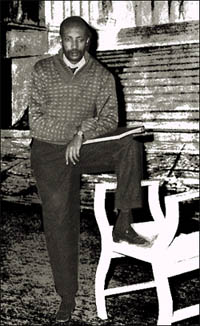 Work Habits ... Mahlet: His study in the house was a shrine. Very few people were allowed in. He had papers everywhere and woe-be-tide the unknowing serateNa who took it upon herself to clean up and make piles during dusting. Another thing about Dad and his work is that he reads, hums and sometimes sings his material out loud while he is composing. This, as you can imagine takes getting used to. The poor newly minted serateNa would fly in timidly saying "abet, abet" every time she heard his voice, only to see the master of the house flailing his hands in the air and speaking in tongues. If he noticed her, meaning if he was interrupted, he would say "Man Terash? Bey bunayen amuQiliN." Till this day, Dad is an avid "drinker" of hot beverages that get heated and re-heated over ten times before finally being spilt out. Yodit: Sometimes he would go off for a few days to write. His favorite retreats were Ambo, where he grew up and wrote his first play at the age of thirteen, and Nazret or Adama. My favorite vacation memories are of the times we accompanied him for a few days because we were off from school. Most of the time he was so absorbed in his writing, we pretty much run as wild as the staff of the Ras Hotel let us. When in Ambo we got to know our fatherís extended family and hung out with the many cousins we didnít get to see often. I now suspect that the reason for our accompanying him to Ambo was not limited to providing us with a Ďspaí experience at the famous hot water springs as our SELEDA editors would have you believe. [Editors respond: Ere iNa mn bEt nen ... but, er ... they have Brazilian mud baths?] I now know those are the experiences that connect me to his childhood. I now know the places his refers to when he relates stories to us. I now know that as much as he invested in providing us with private school education, he was also keeping us grounded, in touch with his experience and the reality of Ethiopia and Ethiopians including our cousins. This is why "Yidres Lewendime LemalawQew" is one of my favorites of his poems. † Life Stories ... Mahlet: He certainly has the makings of the absent-minded professor. Driving us to school, for example, if we ran into one of his buddies on the road, he would, like a teenager, start racing to see who would get to a traffic light first. We would, of course, be eager participants in this race, egging our father on. Unfortunately, on a few occasions we would get to Arat Kilo in the lead and then Dad, who had by then zoned out, would go around the circle once, then twice and then a third time forgetting where he was headed and how to get there. Needless to say, we lost the race in some occasions. Yodit: His writing takes place everywhere and anytime. I laugh at it now, but I also remember my embarrassment as a young girl when on many occasions, our father would pick us up from school and drive us home only to transform into the eccentric artist before we made it home. We would be stopped at a red light and he would reach for any piece of paper at hand to jot down his inspiration of the moment, to put on paper the words that at times seem to tumble out of him, unstoppable. He reaches for the nearest thing to write on; receipts, the back of business cards, even the margins of whatever magazine or newspaper he happens to be reading. The light would turn green but we would remain immobile because he was lost in his work. The impatient drivers behind us would honk relentlessly trying to get him to move before the light turned red again, oblivious to the fact that an artist was at work. As a kid, it was embarrassing to be at the receiving end of the gilmiCHas and occasional sidibs that were flung towards our car. A few times, people would recognize him and just stare or smile knowingly as they whizzed past us. Father ... Mahlet: His love is overwhelming! Literally. When either one of us falls ill, let us say with a bout of Ďflu, a typical Dad reaction is "Mn aderekush." Itís all about him. He will declare with a straight face "anchi malet ine nesh" or "I donít know where I end and you begin". Poetic? Yes. Scary? YEESSS. Especially when you are trying to become your own person. He is a wonderful, loving parent. Very passionate, very intense. He is not a hands on father. He often tunes out of conversations at the dinner table sometimes abruptly pulling a pen out of his pocket and vigorously writing on napkins etc. We are used to him being there but not being present and it seized to be an oddity at a very young age. But when he is present, he is present full force. Loving, open to ideas and dialogue. He was at times the cool parent willing to pick us up after school parties at 6:00 a.m. and conspiring with us to sneak clothes out of our motherís closet. Yodit: I grew up believing my father hung the moon and the stars. Why wouldnít I? He was always very affectionate. Growing up, I always knew that he loved me. He taught me to swim, and played jump rope with us. I do most of my thinking on long walks, a habit I picked up from him when he would take one or two of us to accompany him in his daily evening ritual of walks around the neighborhood. I was always happy to go even when I was still so small, and even as I had to jog to keep up with his long strides. I was happy to have him share with me the things on his mind or stories from his childhood. I was always aware that he was providing us with the best opportunities. He was giving us opportunities that he never had when he was growing up in Goremti and Ambo. I was and am always proud to walk beside him. It is true to some extent that our everyday experience at one of Addis Ababaís private schools (which SELEDA editors love to bash and tear to bits at every given opportunity) [Editors respond: Ere bínguss ... Not EVERY opportunity] did not entirely immerse us in things Ethiopian. However, I am happy to recall, and to let our dear editors know that we were blessed with some very fine teachers who used every minute of our AmariNa class periods to ingrain in us as much EtioPiawinet as they could in one hour bites. I am sure many of us who have been taught by them remember Ato Atnafu, Ato Alemayehu, the late Ato Waqo and Ato Mekonnen. In fact, other than the rare occasions that we were allowed to stay up late and happened to catch our father being interviewed on television, one of the first times I realized he was a public figure was when Ato Waqo invited him to speak to our class. I remember how our teacher hung on Dadís every word and how proud I felt to have MY father teaching our class. I will not, however, get into the subject of the statements of complete puzzlement on the faces of some of my classmates as they tried to follow the lecture ... they know who they are. His Personality ... Mahlet: Dad has always been special. Family, friends and fans have the urge to protect him from the nitty gritty of life and are eager to serve him. He is to be shielded, left alone to his creativity, be taken care of ... The phrase "benevolent dictator" might be one way of describing him. He has a very special way with people. He is always curious and tries to understand "where people come from." He also had the tendency to feel all those who cross his path and come into his life are his to "lavish" with demands and errands. It always amazes me at what he gets away with. People are exceptionally generous and accommodating. Very few use the word "no" around him. Yodit: Yes, those of us who know him well see the love that comes with the tasks he assigns us. He is not one to make demands of those he does not feel close to. Everyone who is a part of the extended family and all our friends have come to understand that an order from him is equal to a declaration of his trust and affection. When he asks you to work on a project, sometimes even seemingly overwhelming ones, or run an errand for him, he is also telling you he knows you are capable, pushing you to your potential and saying, "I prefer you to handle this for me." That is why he rarely gets a "no" from any of us. But even many of those who do not know him personally seem to treat him in a differential way. I remember a particular visit to a Chinese restaurant in New York City where we had been once before. On a return visit, the owner greeted him by name, took his coat and hat, and ordered us a drink on the house just from a few words they had exchanged at our previous visit a few weeks ago. Of course, he is special to me but I am always amazed at the relationship of others to him. Mahlet: It is hard to say that he is a good conversationalist. He is at times a good listener but by far a better orator. Once has set up his mind to say something, there is no cutting in or diverting him off his path. By the same token I also adopted the respect and "fear" others had of him. Actors much older than him called him "Gashe" and people tend to tiptoe around him. Art is what it is to you. I often find myself wondering how he got to be the way he is. Sodifferent from his siblings and friends and from anybody else I know. What drives him? What keeps him going? He has looked death in the eye on more than one occasion. He looks frail but has an inner strength of steel that enables him to defy disease and the verdicts of modern medicine. He is a complicated man, but also a very simple one with very basic and simple needs. He is a public man but also has a very private side to him. He is demanding, but in a very un-abesha, clear way (sorry for the non-PCness). He knows what he wants and what he does not want and he makes sure you know it too. No room for second- guessing or reinterpreting here. Yodit: One of the things I most admire about him is his ability to get things done when he wants it. He is a master of bluntness and is not one for the murky, round-about Abesha style of conversation. This is not to say that he is not diplomatic, because he can be very charming. But he does have a commanding presence that people react to. He is almost always addressed with the affectionate and familiar "Ante Gashe" and not too many call him "Antu", I have been told "Ye Artist Antu Yelewim"- I suppose meaning that he is a public figure which makes him familiar to most everyone. He may be Gashe but he is also highly respected. From family to friends to acquaintances, many treat him with awe. I am not immune to him because I am his daughter. In fact, I feel that being more intimate with the history of his life, makes me more aware of his accomplishments. I always compare his childhood with mine and am amazed to see what he has accomplished against great odds. How many of us can brag national and international recognition after starting out as a bare foot shepherd boy? How many of us can express ourselves so eloquently in a language that is not our first?
Ethiopia ... Mahlet: Dadís love for Ethiopia ... Et-Yo-Bia knows NO bounds. I know no one so enamoured so proud so confident about Ethiopia. It is indeed one of the ironies of life that he, of all people would be forced to live removed from the country he so loves. And Ethiopia loves him back. How popular and widely admired my father is by Ethiopians back home and abroad. This was made apparent in the most powerful way on his arrival here in the US in critical health. People were and continue to be extremely generous with their support and their concern. Complete strangers taking it upon themselves to organize fundraisers in Ethiopia and in different cities in the US, Canada and Europe; calling, writing always inquiring about his health and extending their support... It has been a very heart warming and humbling experience. Yodit: I, too, believe that there are few who love Ethiopia the way our father does. That is why I canít think of a more ironic test for him to endure. He who loves his beloved Imama EtioPia with all his being, who rejected endless "opportunities" to live abroad, is now exiled from his home by the lack of medical facilities there. But the same love and respect that he has for his country is being shown to him by all of you who have given their generous support in all sorts of ways. He still basks in the warmth of all things Ethiopian that surround him here. Fan ... Mahlet: When did I first become a fan of his work? Perhaps naively as early as nine when we were recruited as extras for his play Abugida. I loved the perks of being the dramatistís daughter. Access to the backstages of Beherawi and Mazegaja BEt theatres and to the prominent actors and artists of the time. Hanging out with Gash Wegayehu Negatu and ĎTiye Asnaqetch Worqu ...; rummaging through the wardrobe room, waiting for the makeup artist to apply soot on our face using burnt cork to portray the hunger-stricken young children we were to be. It was EXCITING. It was also very different from the life my friends and classmates, as far as I could tell. I was proud and happy but also slightly embarrassed to share this part of my life with my mates at school. It was a mixed bag requiring two personalities. A couple of years later, I was actually given a speaking part in another play and had my name on the billboard ó the equivalent, I now understand, to having your name in lights on Broadway. It was truly exhilarating. I am sure these events have created a love of literature and especially drama within me. I was going to say I did often secretly consider acting as a career, but my hunch is that many of my classmates may have harbored the same dream. My favorite works? The poems in Isat Wey Abeba, especially when read aloud by an actor worth his/her salt. Some of these poems like "Yidres LeWendime", for example, bring tears to my eyes every time ... I have to admit I am partial to his interpretation of Shakespeare over anyone elseís. Have you seen Aleymtsehaye Wodajo play Opehlia? Abebe Balcha take on the moor in Othello? Dadís adaptation of Shakespeare is so identifiable, so Ethiopian, it leaves me wondering if the bard himself did not grow up in Ambo or somewhere in Ethiopia. I perhaps started to appreciate him as an artist during my college years at AAU. I took a few Amharic literature courses and understood officially that he was one of the leading figures in the field. I have to agree with the general notion that most of his works (especially some of his earlier Amharic poems) are very difficult to understand. I have had a few friends interpret and explain his works to me. Some of the more daring interpretations, if accurate, would make me blush had I been a ferenji. Dad is the greatest storyteller. He recounts characters from his childhood. Characters who have grown greater than life through his works. Hearing him vividly re-create events, sounds and smells, and understanding how these characters come back to haunt his work, I realize I know them myself. I know Jillu Moro. In my mind's eye I clearly see him in Amboís Arada market, tipsy after a few rounds of kosho Tella, singing and lamenting about Lasibe, who was responsible for the gonorrhea he suffered from and eventually took his life. He is a master at weaving cultures and backgrounds together. I may not always share his point of view, but I am in awe of his knowledge of history and his confidence in his controversial theories. A Pan-Africanist certainly and perhaps even a Pan-globalist (so long as the premise that "everything originates from Ethiopia" remains intact). Does he have an artistís ego? You bet! He is so special to his family, to his friends to his fans. It is hard not to. By the same token he is accessible, warm and friendly. Yodit: I can say my introduction to our fatherís world of theatre and poetry started out pretty early. I have no memories of this, but I am told that as soon as I started walking, each morning as he headed out the door to go to work, I would grab onto his pant legs and refuse to let him leave without me. Apparently, once in a while, he relented and I accompanied him to rehearsals on the stage of the National Theatre, then known as the Haile Selassie I Theatre. Of course, it wasnít until much later on that I realized that I have had the privilege of spending time with some of the best talents of our times. I remember with special admiration and awe the great actor Wegayehu Nigatu. From the earlier days when he would take time out to entertain us with comical faces and sounds, to his amazing transformation into the characters he played, Wegayehu was a fascinating actor. His grasp of characters was so deep, his transformation so absolute, and his talent so complete, that upon seeing him on stage, it was always very easy for me to forget that he was the same man I had been laughing with just hours before. Now, in retrospect, I count myself to be amongst the very lucky to have known this star and I see him as one who has established a high standard for those in his profession. One summer, I got to be part of a group of youngsters who got to act in "Abugida". I was very excited even though my acting career was limited to a none speaking part, hidden in the midst of a group ... which suited my shy personality just fine. This way, I got to "act" without having to act. The fun for me was in having a part in my fatherís play. Sometimes, life as his daughter is like two experiences in one. There is my everyday father, warm, loving, commanding and respected. He is my daddy when he hugs me tight and I kiss him on his forehead as I have done ever since I can remember. He is my dad of adulthood full of concern, wisdom and advice. He is the doting grandfather to my son. Then there is my father the poet, the playwright. Like the actors who transform into the characters he creates, he, too, transforms into the Poet when I see him on stage reading poetry to his audience. I, too, hang onto his words, like my teachers used to do. I laugh and cry with the rest of the audience as I am transported by his words. And like all his fans, I stand up and applaud moved by his magic. Once, after one of his poetry readings, a friend came up to me and told me how much she enjoyed watching my sisters and I enjoying his work. Actors/Friends ... Mahlet: Growing up, our house was open to struggling young actors and artists, some of whom lived with us for many years and remain close family members. I look back fondly at the chaos of some weekends with the occasional azmari and the jokes and reenactments by actors and actresses familiar to everyone from their appearances in Hibre-Tírit, television and dramas. I knew these people personally. They horsed around with us, carried us on their shoulders, threw us in the air, drank a lot and got into heated fights and arguments and teased one another to no end. Yodit: Yes. Our fatherís work was never confined to the conventions of a nine-to-five schedule. His work constantly spilled into our daily lives in the form of actors, writers, poets, painters, young and old, aspiring and professional. We often laughed, cried, ate, played and lived with many of the popular actors, dancers and entertainers of our time. All who were attracted to him and his work came home to him to discuss and debate his and their works. From early on, I learned to share my father with many. Yes, Ďtill this day, many of them remain a part of our family. I now know that I grew up in the Ethiopian version of the Hollywood scene.
Daughters ... Mahlet: I am extremely proud of my father. I am one of his ardent fans (for the works I understand) and more recently find myself playing the role of protector. It is often hard for me to reconcile my public father with my private one, and yes, I do long for more of the latter on some occasions. I cannot disregard the growing pains especially with us reunited and living together after a decade apart. The little girl fearful of disappointing him, of not living up to his expectations still resides within me. I find myself tiptoeing around his ego, desperately trying to shield him from the demands and challenges of an immigrantís life. I like to think we are successfully and gradually developing an adult relationship with new levels of understanding. How does it feel to be his daughter? It is an exhilarating journey full of questions like"Andachihum atiSifum? Weyew mnnew?" A life slightly more on the public side (which I could often do without). This, of course, begs the question, "Why did you agree to write this essay?" Aydel? Life with dad can often times also be tumultuous. He may be popular and well liked but he certainly has his share of detractors, and in some instances perhaps even enemies. Why shouldnít he? He is a strong-willed with very strong opinions. He says whatever he wants to say, whenever he wants to say it. He is fearless in that regard. He generally has difficulty entertaining diverse points of view. In some instances, because of his set ways and views, it appears he actively cultivates enemies. I, more often than not, cherish having him as an apartment mate. Learning from him, negotiating and developing the challenging relationships of a daughter, secretary, cook, and friend and basking in the love and humor he brings to my life day to day. He is so cerebral, so imaginative, so not into the mundane ... it is hard to engage him in the routine or make him understand the bread needs to be won, the laundry taken care of, etc. His concept of household chores is "cute" but I am not sure he is much different from other fathers in this regard. Since he heats up his lunch plate in the microwave (which he insists on calling the air-conditioner), he triumphantly reports to his older sister back home that he has started "cooking". I can only imagine what ĎTaba thinks of us ... subjecting her baby brother to the trials of the kushina at this age and in this condition! I ask my father questions, perhaps not as often as I would like or should. We refer to some of our discussions as our "man to man" sessions (I think I am the son he never had, but that is another story). Some questions remain unasked. Some go unanswered and we donít always share the same views. I remain a loyal daughter, a curious student and an ardent fan. Especially as a fan, I feel some of the allure is in the mystery. It is a privilege to be my fatherís daughter! Yodit: Being his daughter is synonymous with being a proud Ethiopian. I realized the importance of the identity my father had helped me to understand and embrace as a new immigrant. Even as I grappled with life in the Diaspora as a young black woman, as I dealt with issues of racism, and labels that every other person tried to slap on me, I would take refuge in my copy of "Isat Wei Abeba", and remain grounded. People often ask me if I write like him. I believe it takes a special talent to write that way. Not everyone can make harmonious music or paint so vividly with words. Sometimes I do put some of my thoughts to paper, but nothing I am courageous enough to share yet. I have had a friend tease me with "YeIssat Lij Amed". But I think most readers will agree with me it is too large of an expectation to live up to. Also, I have heard that some talents skip a generation, who knows...? Our goal here was not to provide our readers with an objective view of our father, which would be almost impossible for us. It is to provide glimpses of our experiences as his daughters. So this whole project can be nothing but personal for us. So, how is it that our dear SELEDA Editors have managed to have us spill our guts while they remain incognito? Well, perhaps it is the Fatherís "sin" being visited on the son (or daughters, in this case). How can we remain anonymous when our father belongs to all of Ethiopia? Our father might be officially known as Poet Laureate Tsegaye Gabre-Medhin of Ethiopia, but to us, he is Dad, short for Daddy, which our dear grandfather Ato Gabre-Medhin always loved and believed was an Oromo nickname we used for our father. He thought we were mispronouncing the Oromo word ĎDadií...meaning "Tej." |
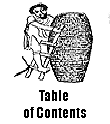
|

|
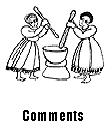
|
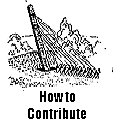
|
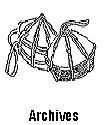
|
| © Copyright SELEDA Ethiopia,† January 2001. ††All Rights Reserved. |
